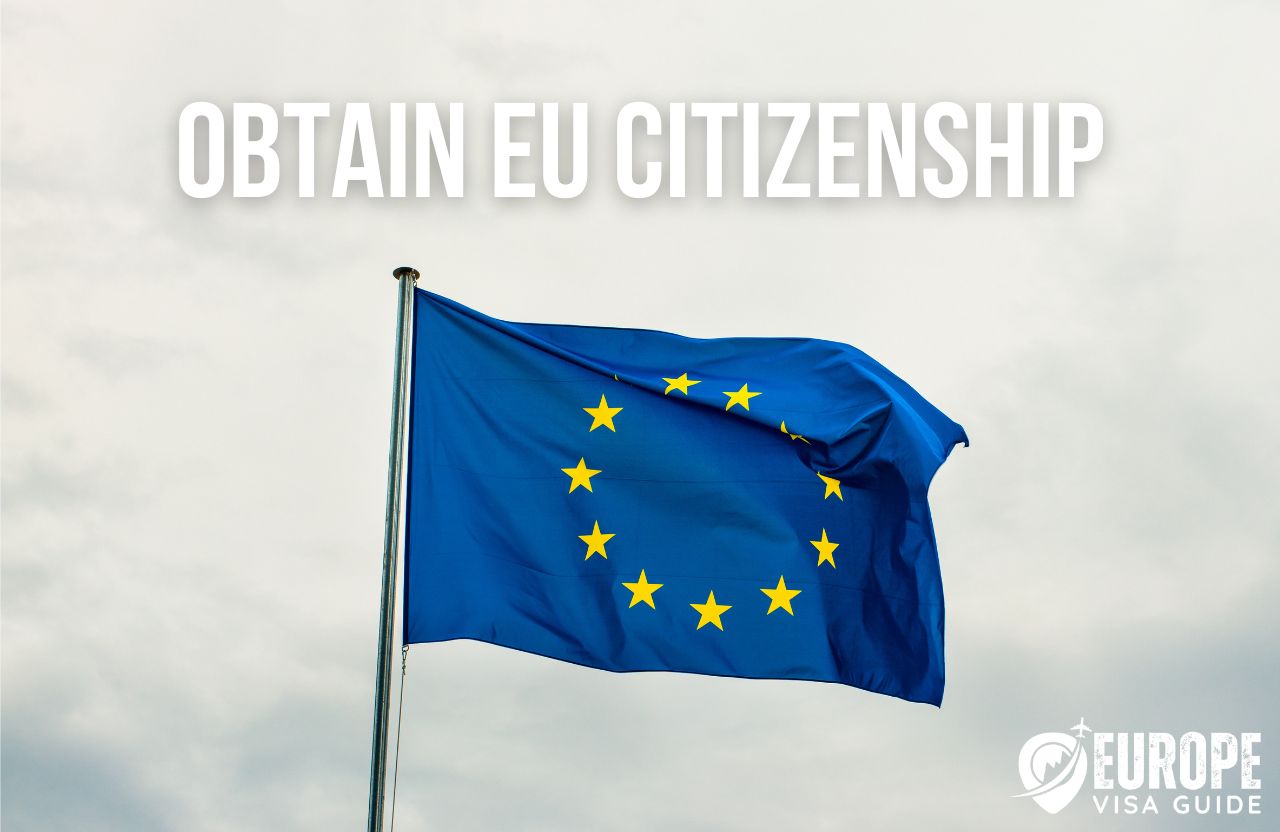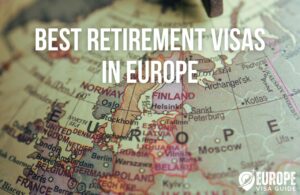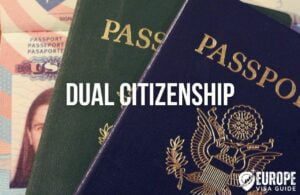
Table of Contents
In today’s globalized world, having the opportunity to live and work in different countries is a valuable asset. For individuals seeking to enjoy the benefits of European Union (EU) citizenship, there are several pathways to explore. This comprehensive guide will walk you through the four main ways to become an EU citizen and live freely in Europe. From acquiring citizenship through descent or marriage to obtaining it through residency or investment, we will cover all the essential information you need to know.
Introduction
The European Union is a political and economic union consisting of 27 member states. EU citizenship grants individuals certain rights, freedoms, and protections according to EU law. It allows individuals to move, work, study, and retire anywhere within the EU, providing immense opportunities for personal and professional growth.
How to get European Citizenship
There are four main ways to become an EU citizen: through descent, through marriage, through ordinary residency, and by investment. Each pathway has its own requirements and timelines, so let’s delve into each option.
Through Descent
Acquiring citizenship through descent involves having parents or grandparents who are citizens of an EU country. Some countries, such as Italy, even allow individuals to apply for citizenship based on great-grandparents’ nationality. Citizenship through descent is often a straightforward and relatively inexpensive option, but it depends on your family history and ancestry.
Through Marriage
Another route to EU citizenship is through marriage to an EU citizen. The timeline for citizenship through marriage varies across countries. For instance, Spain offers one of the fastest pathways, granting citizenship after just one year of marriage. Other countries may have different requirements and timelines, so it’s important to research the specific regulations of your target country.
Through Ordinary Residency
Citizenship through ordinary residency involves living in an EU country for a specified period of time. The duration varies depending on the country, with timelines ranging from one year to over ten years. Some countries, like France and Ireland, have shorter timelines of five years, while others, such as Austria, Italy, Spain, and Greece, may require ten years of residency. It’s crucial to understand the residency requirements and regulations of your chosen country.
By Investment
One popular way to obtain European citizenship is through investment. Some countries offer fast-track citizenship by investment programs, where individuals can obtain a passport in a relatively short period, usually without having to spend many years residing in the country. Other countries offer residency by investment programs, where individuals can obtain immediate residency by making an investment, and after a certain number of years, become eligible to apply for citizenship.
The Meaning and Benefits of EU Citizenship
EU citizenship carries numerous benefits and rights that enhance an individual’s freedom and opportunities within the EU and beyond.
Freedom of Movement
One of the most significant advantages of EU citizenship is the right to freedom of movement. EU citizens can freely settle, work, study, and retire in any EU member state. They can also travel easily within the Schengen area using just their national ID, without the need for a passport. This freedom allows individuals to explore different cultures, pursue career opportunities, and embrace new experiences across the EU.
Rights and Protections
EU resident have a range of rights and protections according to EU law. They can vote and run for office in national elections of the country they reside in. They can also participate in European elections and contribute to EU-wide decisions. EU citizens benefit from social security systems, access to healthcare, and protection against discrimination within the EU.
Consular Protection
European citizenship provides consular protection when traveling abroad. If an EU citizen visits a country where their country of citizenship is not represented, they have the right to consular protection from embassies of other EU member states. This assistance ensures individuals receive support and guidance in case of emergencies or legal issues when abroad.
The Significance of an EU Passport
An EU passport is a document issued by any EU member state, granting the holder the right to travel and reside within the EU. It offers numerous advantages, including freedom of movement across all 27 EU member states, the European Economic Area countries, and Switzerland. With an EU passport, individuals can enjoy the benefits of living and working in multiple countries, access top-quality healthcare systems, and experience diverse cultures within the EU.
Citizenship Pathways
To obtain EU citizenship, individuals can explore various pathways based on their personal circumstances and goals. Let’s examine the most common pathways in more detail.
EU citizenship by Descent or Ancestry
European citizenship by descent or ancestry is a popular option for individuals with parents or grandparents who are citizens of an EU country. Each country has its own rules regarding the number of generations eligible for citizenship. For example, Italy allows individuals to apply for citizenship if they can prove Italian ancestry up to the great-grandparent level. This pathway is relatively straightforward and accessible for those with the required family ties.
Marriage
Citizenship through marriage is another viable option for individuals married to an EU citizen. The timeline for obtaining citizenship through marriage varies across countries. Spain, for instance, grants citizenship after just one year of marriage. Other countries may have longer timelines and additional requirements, such as language proficiency or integration tests. It’s essential to research the regulations of your target country to determine if this pathway is suitable for you.
Residency
Acquiring citizenship through residency involves living in an EU country for a specified period and meeting certain criteria. The length of residency required differs from country to country, with timelines ranging from five to ten years. For example, France, Belgium, Portugal, Ireland, and Sweden offer relatively shorter timelines of five years, while countries like Austria, Italy, Spain, and Greece require ten years of residency. Residency provides individuals with the opportunity to integrate into the local community, learn the language, and contribute to society while fulfilling the necessary requirements for citizenship.
Investment
Citizenship by investment programs, often known as Golden Visa programs, offers an accelerated pathway to EU citizenship. These programs allow individuals to invest in a country and, in return, gain residency or citizenship. Some countries offer fast-track citizenship programs, where individuals can obtain citizenship without spending many years residing in the country. Other countries offer residency by investment programs, where individuals can obtain immediate residency and become eligible for citizenship after a specified period.
The First Step: Residency in an EU Country
To become an EU citizen, the first step is to establish legal residency in an EU country. Residency can be obtained through various means, including employment, self-employment, passive income, investment, or studying. Let’s explore the different options in more detail.
Residency through Employment
One traditional way to obtain residency in an EU country is through employment. This involves finding a job in the country and obtaining a work permit from the employer. However, it can be challenging for non-EU citizens to secure employment, as EU employers often prioritize hiring individuals from within the EU. Exceptions are made for individuals with specialized skills or those in high-demand sectors. It’s important to research the job market and employment regulations of your target country before pursuing this pathway.
Residency through Self-Employment
Self-employment is another viable pathway to residency in an EU country. Setting up as a self-employed individual in the target country and conducting business activities can provide the opportunity to obtain residency. However, each country has its own rules and regulations regarding self-employment. Some countries may have bureaucratic processes or specific requirements for establishing self-employment. It’s crucial to thoroughly understand the regulations and procedures of your chosen country.
Residency through Passive Income or Independent Means
Residency through passive income or independent means is an attractive option for individuals with income from sources such as investments, pensions, or rentals. Some EU countries offer residency visas for individuals who can demonstrate a certain level of passive income. These visas are often referred to as retirement visas or passive income visas. The definition of passive income varies from country to country, but it typically includes income received without actively working. Countries like Portugal, Luxembourg, Cyprus, and Greece offer residency pathways for individuals with passive income. These pathways may require a minimum monthly income and proof of financial stability.
Residency through Investment
Investment is another pathway to obtain residency in an EU country. Some EU countries offer residency programs that require individuals to make specific investments in the country. These investments can include real estate, venture capital, private equity funds, or other eligible investment options. By making the required investment, individuals gain the right to reside in the country and, in some cases, become eligible for citizenship after a specified period. Portugal, Greece, Spain, and Cyprus are among the countries that offer residency by investment programs, commonly known as Golden Visa programs. Each program has its own investment requirements and criteria, so it’s essential to carefully review the details and regulations of the chosen program.
EU Countries with Golden Visa Programs
Golden Visa programs offer individuals the opportunity to obtain residency or citizenship in an EU country through investment. Let’s explore some of the EU countries that offer these programs.
Fast-track Citizenship by Investment Pathways
- Cyprus: Citizenship by investment program with a minimum investment of approximately 2.2 million EUR. (SUSPENDED)
- Malta: Citizenship by investment program with a minimum investment of 690,000 EUR and a one-year timeline for passport issuance.
- Bulgaria: Citizenship by investment program with a minimum investment of approximately 1 million EUR and an 18-month timeline for citizenship acquisition.
Residency by Investment Pathways Leading to Citizenship
- Portugal: Portugal Golden Visa program offers residency by investment with a minimum investment of 280,000 EUR. After maintaining residency for a specified period, individuals become eligible to apply for citizenship.
- Greece: Greece Golden Visa program offers residency by investment with a minimum investment of 250,000 EUR. After maintaining residency for seven years, individuals become eligible to apply for citizenship.
- Spain: Spain Golden Visa program offers residency by investment with a minimum investment of 500,000 EUR. After maintaining residency for ten years, individuals become eligible to apply for citizenship.
- Italy: Italy Golden Visa program offers residency by investment with a minimum investment of 500,000 EUR. After maintaining residency for ten years, individuals become eligible to apply for citizenship.
- Germany: Germany offers a residency by investment program, and after eight years of residency, individuals become eligible to apply for citizenship.
- Cyprus: Cyprus offers a residency by investment program, and after five years of residency, individuals become eligible to apply for citizenship.
Evaluating the Best EU Citizenship Options
When considering EU citizenship options, it’s important to evaluate various factors such as the country’s dual citizenship policies, physical stay requirements, tax residency obligations, and language proficiency levels. Here is a comparison of some popular EU citizenship options:
| Country | Minimum Timeline | Dual Citizenship | Physical Stay | Tax Residency Required | Language Level |
|---|---|---|---|---|---|
| French citizenship | 5 years | Yes | 183 days per year | Yes | B1 French |
| Italian citizenship | 10 years | Yes | 183 days per year | Yes | B1 Italian |
| German citizenship | 6-8 years | No | 183 days per year | Yes | B1 German |
| Portuguese citizenship | 5 years | Yes | 7 days per year | No | A2 Portuguese |
| Spanish citizenship | 10 years | No | 183 days per year | Yes | A2 Spanish |
| Irish citizenship | 5 years | Yes | 183 days per year | Yes | English only |
| Luxembourg citizenship | 5 years | Yes | 183 days per year | Yes | B1 Luxembourgish |
| Swedish citizenship | 5 years | Yes | 183 days per year | Yes | English or Swedish |
It’s worth noting that some countries may require individuals to renounce their existing nationality, while others allow dual citizenship. Additionally, some individuals may consider renouncing their US citizenship for tax purposes, as the US is one of the few countries that levies citizenship-based income tax on non-residents.
Becoming an EU Citizen in Portugal
Portugal offers attractive opportunities for individuals seeking EU citizenship. Let’s explore why Portugal is a prime location and examine the benefits of acquiring citizenship in this country.
Portugal’s Residency Pathways
Portugal offers several flexible and accessible residency pathways to suit various lifestyles and goals. These pathways include the Portugal Golden Visa program, which is one of the most successful residency programs in the EU. The Golden Visa program allows individuals to obtain residency by making a minimum investment of 280,000 EUR (subject to certain criteria). It offers potential returns on investment through investment funds and real estate. Additionally, Portugal introduced the D7 passive income visa, which is a pathway for individuals with income from passive sources, such as pensions or rentals. The recent launch of the Portugal Digital Nomad Visa provides a new option for salaried remote workers.
The Portugal Golden Visa Program
The Portugal Golden Visa program is an attractive opportunity for individuals looking to obtain residency and, eventually, citizenship. Previously, the program allowed individuals to invest in real estate; however, recent changes have removed real estate from the program. Now, the best way to obtain the Golden Visa is by investing in funds. This program offers a pathway to citizenship in just five years, making it one of the fastest routes to EU citizenship. Portugal allows dual citizenship, providing individuals with more options and flexibility.
The D7 Passive Income Visa
Portugal’s D7 passive income visa is another pathway for individuals with passive income. To be eligible for the D7 visa, applicants must have a minimum passive income of 705 EUR per month, along with 12 months of savings. The D7 visa offers a four-month timeline for application processing at the embassy and requires a physical stay of 183 days per year. This visa allows individuals to enjoy the benefits of living in Portugal while maintaining their passive income streams.
The Portugal Digital Nomad Visa
For salaried remote workers, Portugal recently introduced the Portugal Digital Nomad Visa. This visa is specifically designed for individuals with a salaried remote job. To be eligible, applicants must have a minimum monthly remote work salary of 2820 EUR and 12 months of savings. The Portugal Digital Nomad Visa offers a four-month application processing timeline at the embassy and requires a physical stay of 183 days per year. This visa provides an excellent opportunity for individuals seeking the freedom to live and work remotely in Portugal.
The Timeline to EU Citizenship
The timeline to obtain EU citizenship varies depending on the chosen pathway and the country in question. Citizenship by marriage may take as little as one year, while citizenship by investment programs can provide accelerated routes to citizenship. Naturalization, through ordinary residency, often requires a minimum of five years of residency, with some countries extending the timeline to ten years. It’s crucial to understand the specific requirements and timelines of your chosen pathway and target country.
Obtaining Citizenship with Passive Income
It is possible to obtain citizenship through passive income, but it typically requires first establishing residency in your target country. Not all EU countries allow third-country nationals to become residents with passive income, but Portugal offers one of the fastest and most flexible pathways. After just five years of residency in Portugal, individuals with passive income can become eligible to apply for citizenship. Portugal’s low cost of living and the rise in popularity of digital nomad visas make it an attractive option for individuals seeking to establish residency and eventually obtain European citizenship.
Frequently Asked Questions
Which EU country offers the easiest EU citizenship?
Several EU countries offer relatively straightforward pathways to citizenship. Portugal is known for its flexible residency programs and fast-track citizenship options, making it one of the easiest countries to obtain citizenship. Ireland also offers a straightforward pathway, especially for British nationals who can move to Ireland without a visa. Malta and Luxembourg also have citizenship by investment programs that facilitate the acquisition of citizenship.
How to get EU citizenship?
There are several ways to obtain EU citizenship, including through descent, marriage, birth, or naturalization. Each pathway has its own requirements and timelines. Citizenship through descent or marriage is often the simplest and fastest option for individuals with the necessary family ties. Naturalization, which involves obtaining residency and fulfilling specific requirements, is another common pathway. Citizenship by investment programs offers an accelerated route to citizenship in some EU countries.
How hard is it to get EU citizenship?
The difficulty of obtaining EU citizenship depends on various factors, including the chosen pathway and the country in question. Citizenship through descent or marriage is generally more straightforward than naturalization. Some countries, such as Malta, offer fast-track citizenship programs for individuals willing to make significant investments. Overall, the process can be complex and time-consuming, but with proper research and guidance, it is achievable.
How can I become an EU citizen after Brexit?
For individuals affected by Brexit, becoming an EU citizen typically involves obtaining residency in an EU country and then applying for citizenship through naturalization. The specific requirements and timelines vary depending on the country. For example, individuals can move to Ireland without a visa and apply for Irish citizenship after five years. Researching the residency and citizenship regulations of your target country is crucial to navigating the post-Brexit landscape.
How can I move to Europe permanently?
To move to Europe permanently, individuals can apply for long-term residency visas in EU member states. This can be achieved through various pathways, including employment sponsorship, study programs, or residency based on passive income or investment. The application process usually begins by applying for an entry visa at the nearest embassy of your target country. Once you arrive, you can proceed with obtaining a residency permit and renew it until you become eligible for permanent residency or citizenship.
Can US citizens live in Europe?
Yes, US citizens can live in Europe. For short-term stays, US citizens can travel freely within the Schengen area for up to 90 days within a 180-day period. To live in Europe long-term, US citizens need to apply for a residency visa. This can be achieved through various pathways, such as employment sponsorship, study programs, or residency based on passive income or investment. Each country has its own regulations and requirements, so thorough research is essential.
Conclusion
Obtaining EU citizenship provides individuals with the opportunity to enjoy the benefits of living, working, and traveling freely within the EU. Whether through descent, marriage, residency, or investment, there are multiple pathways to explore. By understanding the requirements, timelines, and benefits associated with each pathway, individuals can make informed decisions and embark on a journey toward EU citizenship and the freedom it offers. Embrace the possibilities that EU citizenship brings and unlock a world of opportunities in Europe.





